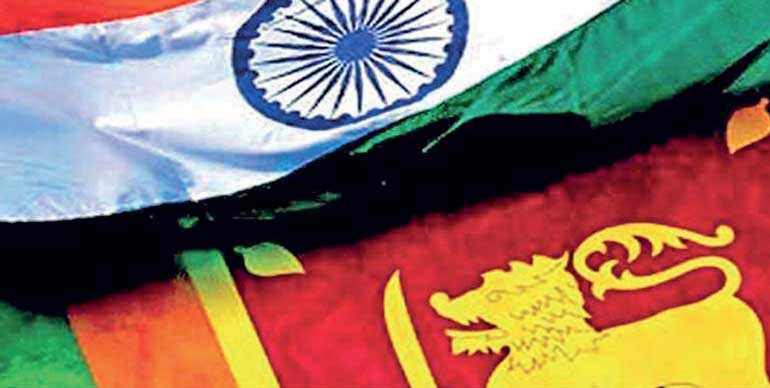Friday Feb 27, 2026
Friday Feb 27, 2026
Thursday, 28 June 2018 00:00 - - {{hitsCtrl.values.hits}}


By Srimal Fernando and Megha Gupta
India, the largest economy in the South Asian region, is predicted to grow at 7.3% GDP as per the World Bank Group and the current economic policies adopted by Prime Minister Modi is having a positive impact not only on India but also on its neighbouring country, Sri Lanka.
In the past four years, the bilateral trade between the two countries has increased to about $ 4.38 billion and this has had a direct impact on the domestic market of Sri Lanka. Since the Indo-Sri Lanka Free Trade Agreement (ISFTA) has been signed the bilateral relationship between the two has strengthened to increase the trade volume in several areas.
Intermediate goods, transportation and capital goods imported from India comprises over 70% and this directly benefits Sri Lanka’s industrial output. Since India’s economy is growing at a fast rate, with around 300 million middle class, the tourism sector of Sri Lanka is seeing prospects with the ever increasing Indian tourists visiting the island nation.
The number of middle class tourists visiting Sri Lanka from India has surpassed more than 300,000 annually which is in turn helping the island nation’s hospitality industry. Additionally, the on arrival visa system is making it easier for the tourists to travel to Sri Lanka thereby adding to their tourism sector. In the recent years the two nations have opened their aerospace for an easier movement of the flights for instance the Sri Lankan airline flies 126 flights per week to 14 cities in India.
Port and shipping are other areas which benefits both the nations mutually, and Colombo and Mumbai are some of the busiest handling ports in Asia. Colombo alone handles 43% of the trans-shipment cargo of India which directly benefits the revenues of Sri Lanka. Hence when there is a surge in the Indian economy it will lead to the increase in the volume of cargo cash transaction and services related to it between India and Sri Lanka thereby creating more jobs for the locals and expatriates of these countries.
In the realm of economy, gas and oil are important energy consumption requirements for the Sri Lankans and to meet this requirement the Lanka Indian Oil Company plays a vital role. Lanka Indian Oil Company (LIOC) a subsidiary of the Indian Oil Corporation operates 15 oil tanks out of ninety-nine at the China Bay Trincomalee oil storage facility. Further LIOC operates around 100 pumping stations throughout the country.
In the sphere of transportation, India has immensely contributed in uplifting the railway connectivity of Sri Lanka for instance the relaying of the Northern railway tracks and also in modernising the existing signalling system of the Southern railway lines. The vehicles imported from India are comparatively affordable to the Sri Lankan middle class consumers than importing it from other countries. Ashok Leyland, Tata and Mahindra are some of the widely used vehicles in Sri Lanka especially in the rural areas. Hence setting up Indian vehicle assembling plants in Sri Lanka or carrying out joint venturing procedures could bring down the cost of the vehicles.
Over the last few years, Indian and Sri Lankan companies have established various business ventures together to promote prosperity and to create sustainability. Sri Lankan textile companies such as MAS Holdings and Brandix have set up factories in India thereby providing jobs in both the countries.
Throughout the years the Indian government has positively contributed to the various socio economic causes to uplift the rural base especially in the North and East provinces. The Indian Government has provided over $ 2.5 billion aid and credit line facilities to bring about self-sustainability in these regions. Back in 2010, during the post war period, India pledged to build 50,000 housing units for the conflict affected people. These are some of the generous endeavours that India had ventured into and only if India continues to make positive growth then only it will have a direct constructive impact on Sri Lanka.
Even though Sri Lanka has achieved higher literacy levels it is yet to increase the entrees of students going to universities for Under graduation and Masters. In this regard, Indian public and private institutes have provided adequate facilities for many of the Sri Lanka students to pursue higher education. Affordable and standard education provided by the Indian institutes is giving an opportunity to the Sri Lankan students to travel to their neighbouring country instead of the West.
Sri Lanka, being one of the closest prospering neighbour and with the growth of the Indian economy, it is time for the policymakers to think beyond and make the trade transaction smoother and business friendly for both these countries. To reduce the gap between the rich and the poor, to make things affordable, and to bring down inflation in Sri Lanka it is important for the trade relationship between India and Sri Lanka to grow, such that Sri Lanka is to become a wonder of Asia economically.
(Srimal Fernando is a research scholar at Jindal School of International Affairs, India and a Global Editor of Diplomatic Society for South Africa and Megha Gupta, a scholar of Masters in Diplomacy, Law, Business at Jindal School of International Affairs, India.)